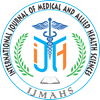BIOLOGICAL DEGRADATION OF ANTIBIOTIC AZITHROMYCIN BY SELECTED BACTERIAL ISOLATES
Pages : 69-85Download PDF
Aim: The increasing presence of antibiotics in the environment has raised serious concerns about their impact on ecosystems and public health. Azithromycin, a widely used macrolide antibiotic, is frequently detected in soil and water, where it can contribute to antibiotic resistance. This study focuses on the biological degradation of Azithromycin by bacterial isolates obtained from soil samples collected in Gwalior, Madhya Pradesh, India.
Method: A total of sixteen soil samples were enriched, and bacterial strains capable of using Azithromycin as the sole carbon source were isolated and acclimatized. These isolates were tested for their growth at varying Azithromycin concentrations (50–500 ppm) and characterized based on morphological and biochemical properties. Further optimization of environmental conditions such as pH and temperature was conducted to enhance bacterial growth and degradation efficiency.
Results: Quantitative degradation studies showed significant reduction in Azithromycin concentration over a 72 Hrs period, confirmed by UV-Visible spectrophotometry. Efficient bacterial strains were further identified through 16S rRNA sequencing and phylogenetic analysis.
Conclusion: The findings of this study highlight the potential of indigenous bacterial strains for the bioremediation of Azithromycin-contaminated environments, offering an eco-friendly solution to reduce antibiotic pollution.
Keywords: Degradation, Azithromycin, Antibiotics, Biological, Bacterial.





